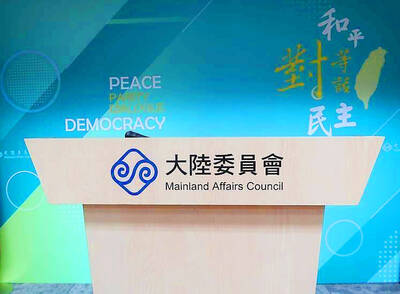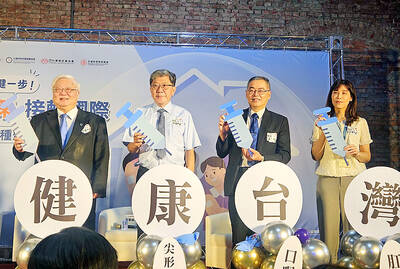Taiwan must tap into the global uncrewed aerial vehicle (UAV) market to obtain the capital necessary to develop a self-sufficient combat drone industry, experts said.
As defense analysts have speculated that China might invade Taiwan in 2027 or 2032, the nation must complete the decoupling of its drone supply chains from China in the next few years, Geosat Aerospace & Technology Inc (經緯航太科技) CEO Lo Cheng-fang (羅正方) said.
The ability to produce combat drones in wartime is crucial for Taiwan’s survival, but the nation’s UAV industry is still in its infancy, said Lo, who is also chairman of the Chiayi-based Asia UAV AI Innovation Application R&D Center.

Photo: CNA
The government should support the domestic industry to ensure Taiwan’s drone supply chains remain unbroken in the event of a military conflict with China, he said.
Drones are an integral part of President William Lai’s (賴清德) Five Trusted Industry Sectors, a category consisting of the semiconductor, artificial intelligence (AI), military, security and surveillance, and next-generation communications industries.
The administration aims to make Taiwan “the Asian hub of UAV supply chains for global democracies,” he said in his inaugural address on May 20.
These supply chains are made of about 40 Taiwanese firms that produce about a dozen drone models altogether, government data showed.
The Taiwanese drone sector was worth an estimated NT$2.86 billion (US$87.15 million) last year, while the global drone industry’s value is expected to reach US$80 billion by 2030.
Chiayi Economic Development Department Director Chiang Zhen-wei (江振瑋) said the global drone industry is split in two, with one side that uses Chinese supply chains and another that does not.
Because of those who have decoupled from China, there is a large opportunity for the domestic drone industry if it is prepared to seize it, he said.
The companies that are part of Chiayi’s drone center represent a complete UAV ecosystem, but the industry would still have to carve out an export market, Chiang said.
The operational costs of automated equipment capable of mass-producing reliable, quality components at scale cannot be funded by the domestic market alone, he added.
Despite Taiwan’s technical prowess, manufacturers cannot be expected to wade into the drone business just to supply domestic demand, said Lo Cheng-ying (駱正穎), a professor of mechanical engineering at National Formosa University.
“Becoming a part of the supply chain for democracies will be crucial going forward,” he said.
National Chung Cheng University strategic studies professor Lin Tai-ho (林泰和) said drones have significant battlefield applications and UAV manufacturing is an industry of ever-increasing importance strategically.
The Taiwanese UAV sector must develop an export market to supplement military contracts, especially as cheaper Chinese parts cannot be used, he said.
The Lai administration made the right call in pursuing the capability to manufacture drones independently of China’s supply chains, even if it is more expensive, Lin added.
Meanwhile, the government would play a key role in coordinating with its industrial partners, Hsuan Yuan Tech Co (璿元科技) CEO Chou Yu-tuan (周玉端) said.
The government must pay attention to industrial requirements in designing projects, as the current approach is leading to the proliferation of non-standard platforms with little commonality, which increases production difficulties and costs, he said.
The contract-issuing bodies of the government frequently demand changes to a project, such as its technical specifications and intended role, further adding to the chaos, he said.
Taiwan Swarm Innovation Inc (臺灣希望創新) CEO Li Chih-ching (李志清) said Washington is looking for allies to replace China in drone supply chains.
Taiwan has the technological capabilities to make drones, but Taiwanese systems are two to three times more expensive than their Chinese counterparts, he said.
Expanding into the global market would enable domestic UAV makers to benefit from the economy of scale and lower their prices to competitive levels, Li said.
However, the Taiwanese UAV sector is unlikely to be competitively priced compared with China, he said, adding the industry should concentrate on making drones for special applications for customers that cannot use systems that have Chinese parts.

A Chinese aircraft carrier group entered Japan’s economic waters over the weekend, before exiting to conduct drills involving fighter jets, the Japanese Ministry of Defense said yesterday. The Liaoning aircraft carrier, two missile destroyers and one fast combat supply ship sailed about 300km southwest of Japan’s easternmost island of Minamitori on Saturday, a ministry statement said. It was the first time a Chinese aircraft carrier had entered that part of Japan’s exclusive economic zone (EEZ), a ministry spokesman said. “We think the Chinese military is trying to improve its operational capability and ability to conduct operations in distant areas,” the spokesman said. China’s growing

BUILDUP: US General Dan Caine said Chinese military maneuvers are not routine exercises, but instead are ‘rehearsals for a forced unification’ with Taiwan China poses an increasingly aggressive threat to the US and deterring Beijing is the Pentagon’s top regional priority amid its rapid military buildup and invasion drills near Taiwan, US Secretary of Defense Pete Hegseth said on Tuesday. “Our pacing threat is communist China,” Hegseth told the US House of Representatives Appropriations Subcommittee on Defense during an oversight hearing with US General Dan Caine, chairman of the Joint Chiefs of Staff. “Beijing is preparing for war in the Indo-Pacific as part of its broader strategy to dominate that region and then the world,” Hegseth said, adding that if it succeeds, it could derail

COMPLIANCE: The SEF has helped more than 3,900 Chinese verify documents, indicating that most of those affected are willing to cooperate, the MAC said More than 3,100 spouses from China have submitted proof of renunciation of their Chinese household registration, the Mainland Affairs Council (MAC) said yesterday. The National Immigration Agency has since April issued notices to spouses to submit proof that they had renounced their Chinese household registration on or before June 30 or their Taiwanese household registration would be revoked. People having difficulties obtaining such a document can request an extension of the deadline or submit a written affidavit in lieu of it. The council said it would hold a briefing at 2:30pm on Friday at the immigration agency’s Taichung office in cooperation with the

The government-funded human papillomavirus (HPV) vaccination is to be expanded to boys at junior-high school starting in September, the Health Promotion Administration (HPA) said yesterday. The Taiwan Society of Otorhinolaryngology, Head and Neck Surgery, the Taiwan Association of Obstetrics and Gynecology, the Taiwan Immunization Vision and Strategy, the Infectious Diseases Society of Taiwan, the Taiwan Head and Neck Society, the Formosa Cancer Foundation and the National Alliance of Presidents of Parents Associations held a joint news conference in Taipei yesterday to raise public awareness about the risks of HPV infection, regardless of gender. Invited to give an address, HPA Director-General Wu Chao-chun